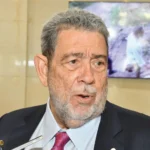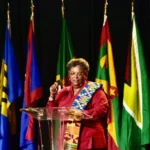By Sir Ronald Sanders
In the face of unremitting climate change threats and unfulfilled promises from industrialized nations, leaders of small island states have courageously taken matters into their own hands. Their frustration with lacklustre funding and inadequate solutions to fortify their countries against climate change has led them to pursue the power of the international legal system. They are seeking justice against those nations whose excessive greenhouse gas emissions pose an existential threat to their peoples.
The International Tribunal of the Law of the Sea (ITLOS) has consented to hear their groundbreaking case in which they are aiming to ascertain the legal responsibility of States for carbon emissions, marine pollution, rising sea levels, and the resultant damage inflicted on other states. The landmark hearing will take place in Hamburg from September 11 to 13, 2023.
It was just a short 21 months ago that the Prime Ministers of Antigua and Barbuda and Tuvalu, Gaston Browne and Kausea Natano respectively, showed extraordinary foresight and bravery by embarking on a novel legal journey to combat the threats of climate change to their peoples’ survival. An historic accord was signed on the sidelines of the COP26 meeting in Glasgow, giving birth to The Commission of Small Island States on Climate Change and International Law (COSIS) as an international body, registered with the United Nations Secretariat, with a mandate to pursue the implementation of international law regarding climate change.
Today, their daring initiative is reaping results. Supported by an international team of legal experts and representatives from five other small island states, their plea for an Advisory Opinion was submitted to ITLOS on June 16, 2023.
Two crucial questions are posed to the tribunal: Firstly, what are the State Parties’ obligations to prevent, reduce, and control marine environment pollution due to climate change effects, including ocean warming, sea level rise, and ocean acidification, all spurred by anthropogenic greenhouse gas emissions? Secondly, how must the marine environment be protected and preserved in the face of these climate change impacts?
Their choice to engage the international legal system is the culmination of years of frustration over industrialized nations’ seeming lip-service and labyrinthine funding mechanisms, proposed at over years of meetings of the UN Committee of the Parties (COP).
Often the pledges that are made do not offer additional money; in many cases the funds are repurposed from other promises that were not kept. Additionally, the dizzying number of new mechanisms that are supposedly set up are not only narrow in their purpose, but the means of accessing them are both obtuse and restrictive.
Among these are the Global Shield Solutions Platform, which builds on the InsuResilience Solutions Fund and a Global Shield Financing Facility set up at the World Bank; the Climate Vulnerable Forum & V20 Joint Multi-Donor Fund that promises to establish a loss and damage program utilizing the GEF Small Grants Programme structure to make smaller funding amounts directly available to affected communities.
Highlighting these inadequacies is the much-lauded ‘loss and damage’ fund, discussed for the first time at the 27th COP meeting in Egypt. While it was hailed as a breakthrough, the reality was a mirage. The practiced and clever negotiators of the industrialized states at COP27 did not establish a fund nor the means to make it operational; they merely agreed to set up a Transitional Committee comprising representatives from 24 countries—10 from developed countries, including the United States, and 14 from developing countries. The purpose of the Committee is to make recommendations to COP28 in December 2023, including on what countries should contribute to the fund, how the fund will be administered, and what funding arrangements might be possible.
When these convoluted mechanisms are coupled with a 13-year failure by industrialized nations to deliver on the promise of providing US$100 billion annually in climate finance for low- and middle-income countries, the resolve of small island state leaders to seek justice through the international legal system is fully understandable.
In pursuing the establishment of COSIS and seeking an Advisory Opinion from ITLOS, the leaders of small island states were frequently discouraged from their path by governments of industrialised nations. The latter fear edicts from international legal bodies which, at the very least, establish their obligations; they much prefer non-binding negotiations such as the COP process in which their considerably greater skills and leverage give them an advantage.
Nonetheless, the small island state leaders pursued their cause relentlessly, understanding that the stakes are too high to acquiesce to pressure. Their commitment resonates with the words of Prime Minister Gaston Browne, who declared, “The time for empty promises is over.” The leaders have been joined by 33 other countries and 9 international organizations in making submissions to ITLOS.
The upcoming ITLOS hearing in September is a significant milestone, with implications that could redefine the climate change landscape. The fight waged by the leaders of Antigua and Barbuda, The Bahamas, Niue, Palau, St Lucia, St Vincent and the Grenadines, and Vanuatu through COSIS is not just for their nations. It’s a fight for climate justice that will resonate across the globe.
(The writer is Antigua and Barbuda’s Ambassador to the United States and the Organization of American States. He is also a Senior Fellow at the Institute of Commonwealth Studies at the University of London and Massey College in the University of Toronto. The views expressed are entirely his own. Responses and previous commentaries: www.sirronaldsanders.com)










